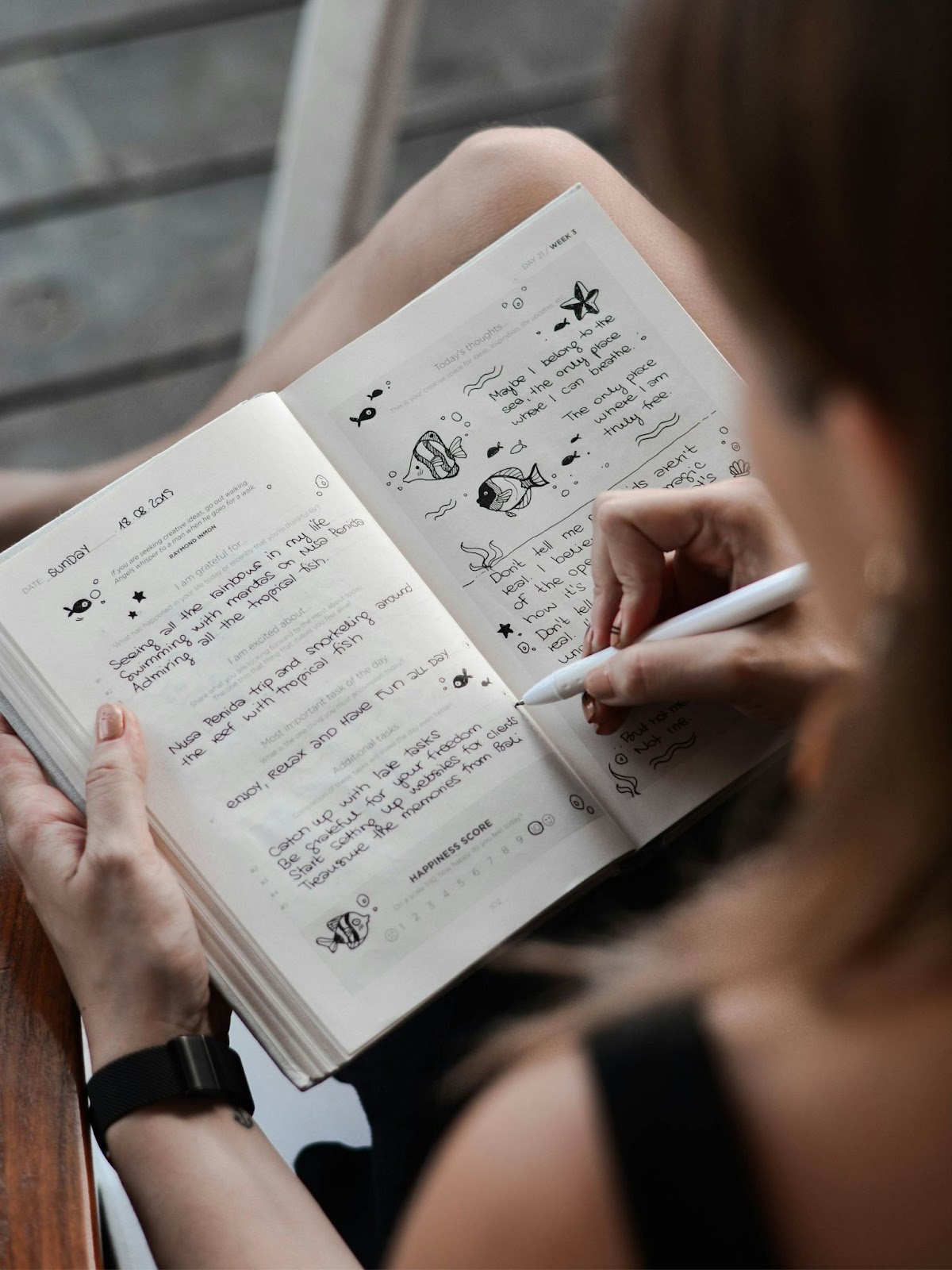Trying different journaling ideas could be your gateway to a happier and healthier life.
After all, research has shown many tangible, real benefits to journaling, particularly related to mental health and well-being.
The fact of the matter is that anyone can journal for any reason. You don’t need to be a professional or talented writer. Rather, journaling is about getting some thoughts and ideas down in front of you to help declutter your mind and create positive steps forward.
With this in mind, we’ve decided to introduce you to ten simple yet inspiring journaling ideas that you can try this year. Each will help to improve your clarity of thought and may have numerous other benefits, too.

Our journaling ideas enhance mindfulness – try the following methods for introspection
1: Gratitude journaling
A gratitude journal is a way of being grateful for what you have. Rather than aspiring for things that you want or believe that you need, a gratitude journal encourages you to think about what is already in your life.
This type of journaling successfully shifts you from negative thinking to a more positive mindset and can help you focus on the present.
Gratitude journaling ideas
- Begin by writing down one thing you’re grateful for every day for one month.
- At the end of the month, express your gratitude to an important person in your life.
- Not sure where to begin? Start your daily entry with the affirmation: “Today, I am grateful for…”
2: Emotional journaling
If you feel overwhelmed and have been struggling with your mental health, emotional journaling could help. This method helps you to understand some of your emotions by noticing them.
For instance, you might instinctively know that you have been angry for a while, but noticing the emotion, writing it down, and waiting for it to pass can be super helpful. When you give names to your emotions and pay attention to them, it can help you become more centered.
Emotional journaling ideas
- Don’t just write in your journal when you’re angry. Set a specific time of the day to write in your journal and notice the emotion that you’re feeling there and then.
- If your emotions fluctuate during the day, keep an emotion diary on your desk at work or on your phone. This can help to track your moods in real-time.
3: Reflection journaling
One of the easiest ways to journal is to reflect on the day you’ve just had. The ideal time to sit down with your journal is immediately before you go to bed. The act of writing out your reflections on the day can also help to improve your sleep.
In fact, research has shown that bedtime writing can help people sleep, but there are many other benefits to reflection journaling. It can help you become more grateful for what you have and will also contribute to a sense of accomplishment when you meet some of your goals and objectives.
Reflection journaling ideas
- Spend five minutes thinking about what happened during the day before writing anything down. This can help with the clarity of your thoughts.
- Consider a list of pros and cons (or highlights and lowlights) to make things easier to list.
4: Travel journaling
Okay, so this type of journal is only relevant to some people, but it’s a brilliant option if you’re enjoying life on the road. Maybe you’ve taken a once-in-a-lifetime trip, or perhaps you’re on your annual vacation.
Either way, documenting your thoughts, feelings, and emotions about new places can be incredibly rewarding. Think about what you see, how you interpret things, who you meet, and what you do. All of these things can help to create a rich tapestry that you can look back on with fondness when you return home.
Travel journaling ideas
- Leave spaces for pictures. When you get home, print out images that you can add to your journal for a more vivid memory of the day.
- Consider both the emotional and practical journey you’re on and how your travels are making you feel.
- Don’t just reflect when travel journaling; look ahead to the next stage of your journey. You can then hold yourself to account and see if it meets your expectations.
5: Mindful journaling
The benefits of mindfulness are numerous. Regular practice can improve your cognitive ability, make you more grateful for what you have and where you are in life, and help to reduce stress and anxiety.
And the beauty of mindfulness lies in its simplicity. It’s the act of being present and bringing your attention to the present moment. Some people achieve this through meditation, while others improve their mindfulness by journaling.
Taking a few moments out of your day to perform mindful journaling can make a big impact on your stress levels and improve your inner peace.
Mindful journaling ideas
- Sit in a quiet spot and observe what is happening around you. Then, note down what you see, hear, or experience in your journal.
- If you’re struggling to focus, look to nature first. You might notice the trees moving slightly in the wind or the distant crackle of thunder. You can then bring in other sights and sounds as you notice the world around you.
- After writing in your mindful journal, close your eyes and meditate for a few minutes to end the experience.
6: Positivity journaling

While it can be helpful to jot down negative thoughts, feelings, and emotions, positivity journaling also has many benefits. This is where you note down positive feelings, actions, and achievements as and when they arise.
This could be as small as having a positive interaction with your son or daughter in the morning. But it could also be a big lifetime achievement like landing a new job or graduating from college. Over time, you will slowly create a journal filled with positive experiences that you can reflect on as you grow.
Again, this type of journaling encourages you to think more positively, celebrating life’s little wins as and when they arise.
Positivity journaling ideas
- Begin with small wins rather than focusing on big goals. For instance, going on your first jog or watching your kids’ soccer game is a small win, but it’s hugely impactful.
- The idea of positivity journaling is not to ignore negative thoughts but to leave them out. You should recognize that they occur, but they don’t have a place in your journal.
7: Journaling for the future
One of the best things about journaling is that it helps you focus on the here and now. But sometimes, it’s good to look and plan a few steps ahead. That’s where journaling for the future comes in.
Here, you can express what you want to achieve in the near or distant future. You can set ambitious goals or keep things modest. You might even create a bucket list of things you want to achieve by a specific age.
The key to future journaling is holding yourself to account. Set clear goals and check back after a specific amount of time to see how you’re progressing. You can update your journal with your success stories.
Journaling for the future ideas
- Consider short, medium, and long-term goals. Think about what you want to do next week, next month, and next year. You can then break your goals down into actionable steps.
- Be specific with your future journal. Instead of writing “in the future, I would like to…” try something like “by Christmas 2025, I must …” It’s much easier to hold yourself accountable when you’re specific with goal setting.
- If you’re struggling with setting goals for the future, you can use Arvin AI to help you with prompts and suggestions that you may wish to include in your journal.
8: Hobby journaling
Research studies have found that taking up a hobby is linked to happiness and improved well-being. You can do so many different hobbies, including sports, arts and crafts, gardening, playing chess, etc.
The key is to find something that you like doing. After all, if you like it and it makes you happy, you’re more likely to continue.
When you start a hobby, consider starting a journal at the same time. You can write about your experiences, any challenges you face, and how you overcome them. It’s also a good idea to set yourself targets so you can develop your skills and become more proficient at your chosen hobby.
Hobby journaling ideas
- Try not to do too much at once and begin with one hobby. Trying too many things at the same time can be overwhelming, and it may cause you to quit.
- Set time aside to write in your hobby journal immediately after completing the activity. This ensures that you write about the experience while it’s fresh in your mind, yielding better thoughts.
9: Spiritual journaling
If you’re a spiritual person, this type of journaling is a great way to explore faith or belief systems. In the context of religion, you might read a daily Bible passage and note down how it makes you feel or what you learn from it. This can be applied to any religious text.
But spirituality extends beyond traditional religions, and there are many ways to connect with the spiritual world or your spiritual self. There are ways to tie spirituality in with mindfulness to be more present, and journaling can be a big part of this.
Spiritual journaling ideas
- Consider why you want to become more spiritual. Perhaps you want to feel a greater affinity to the world around you. Consider your goals before looking within yourself.
- If your spirituality is connected to a religion, consider using a holy book to guide you. This aids with reflection, introspection, and learning, and will help you to jot ideas down.
10: Couples journaling
Most people see journaling as a solitary endeavour, but the reality is you can do it with your partner. This is extremely powerful as you embark on a specific journey together.
For instance, you might be sharing an experience like travel, or you might be going through some tough times together. When journaling as a couple, use a journal each and share your reflections after noting them down.
Opening yourself up and sharing your innermost thoughts with a partner can be extremely impactful and a great way to connect at a deeper level.
Couples journaling ideas
- As you’re not journaling alone, agree with your partner or friend in advance as to what type of journal you want to keep. Be specific and consider a theme or objective you both share.
- Trust is crucial when journaling as a couple. Agree that you won’t share your experience with others, unless you both agree. Be careful not to break the trust and do what you can to keep your thoughts confidential and only between one another.
Recap – Using simple journaling ideas to improve your well-being
The act of journaling can have a hugely positive impact on your health and well-being. Journaling encourages introspection, mindfulness, and consideration. It also helps you to channel positive thoughts and focus on the good rather than the bad in your life as a whole.
If you keep a digital journal and want to polish your thoughts, use our AI Grammar Checker to correct some minor mistakes and improve the flow of your work. This will come in handy if you want to publish some of your journal entries on your blog or personal website.

Journaling Ideas FAQ
You can write anything in a journal. The whole point is that it’s your way to personally reflect on something or plan for the future. We recommend keeping your journal safe and away from prying eyes.
You can check out our ten journaling ideas if you’re stuck for inspiration. Mindful journaling, positivity journaling, and gratitude journaling are all great places to begin.
Yes, of course. You can use Arvin AI to generate ideas for your journal. You can even use our Writing Improver Tool if you want to sharpen your words and sentences as you write.






